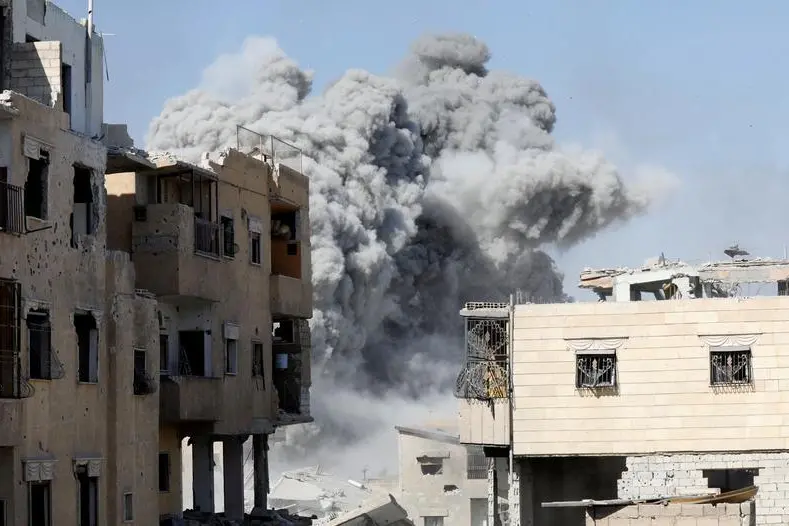PHOTO
Islamic State’s imminent military defeat and loss of all its territory will transform the group into an underground terrorist organisation that uses a web of legitimate companies to extend its goals, so Middle East financial institutions must be more vigilant about who they do business with, a UN Security Council expert has warned.
Speaking on a panel discussing sanctions at the MENA Regulatory Summit in Dubai on Monday, Ghaith Zubi, a Security Council sanctions expert, said: “We have this case now in Iraq or in Syria where the organisation (Islamic State) is in the last phases of its so-called caliphate but at the same time, according to what we received from intelligence services of member states, they were prepared for this stage - i.e. they were investing for some time (in) legitimate businesses.”
He said that a MENA Financial Task Force project found that in some countries, terrorists had bought certain assets, such as real estate or farms, to provide a “clear skin” in a bid to avoid detection by intelligence services.
“Financial institutions need to be more vigilant now compared to 2014-2015,” he urged.
Zubi also said that the UN Security Council “is focusing more on the issue of the relationship between the transnational organised crimes and terrorism financing”.
He said that although this was a global problem, the MENA region was one where the Security Council will be analysing such relationships, noting financial institutions could help further by running additional checks through their own systems.
On the same panel, Sajid Hussain, a senior executive vice-president at Pakistan's United Bank, said that “one of the most challenging parts” of sanctions compliance is dealing with narrative, or implicit, sanctions - i.e. keeping track not only of sanctioned entities, but also any related associates or affiliates that they may use.
He said that “action has to be taken proactively” by financial institutions in this area, such as having a list of suspect entities and figuring out - through addresses used, or ownership structures, for example - if other companies are linked to them.
“It's an ongoing war against these intermediaries and people who are concealing their identity, who are facilitating to bypass the sanctions compliance regime,” he said.
Zubi said that as funds flow back into Syria to back reconstruction projects, financial institutions need “to be more vigilant” to ensure money doesn't end up financing terrorism, as it had in neighbouring Iraq.
Buffer zone
Zubi said the United Nations was paying closer attention to this issue, and that in many cases “you are going to have to have a buffer filtering before any transaction goes from your entity to the end beneficiaries”.
“It has to be secured and cleared by many agencies,” Zubi said.
Scott Ramsey, regional head of sanctions for HSBC, argued that for many banks the prospect of doing deals in Syria was similar to dealing with Iran following the signing of the Joint Comprehensive Plan of Action in 2015.
“I think a lot of financial institutions will be somewhat reluctant,” Ramsey said.
He said some banks who have funded reconstruction projects in other countries have faced criticism so may wish to fund things anonymously, which raises transparency issues. He also warned due diligence could be problematic.
“A lot of the international banks have been out of that deal for quite some time, so you don't actually know who's good and who's not good. You kind-of see a lot of people saying from a risk appetite perspective, ‘I'm not quite sure on this’. However, if you look at the market, you see a lot of companies that want to do this. I'm sure where there's a will, there's a way.”
In an earlier address, Hans-Peter Bauer, a senior advisor to the Wolfsberg Group and the Basel Institute on Governance, said the financial crime compliance regimes introduced around the world “have not made much progress” in terms of how many people end up being prosecuted or how much money is confiscated.
“Some would say that we have kept organised crime better under control, but the idea that following the money would solve the problems of international crime I think needs to be re-thought.”
He was more positive on the fight against terrorism, though, stating that if an event occurs and police identify perpetrators, “most banks can now deliver within 24 hours a lot of historic information on those terrorists”.
“But if the public sector expects them (banks) to go further in the fight against crime, then probably we should find ways how the public sector can share more information with the private sector,” he said, urging closer co-operation between banks and law enforcement agencies.
The MENA Regulatory Summit was hosted by Zawya’s parent company, Refinitiv.
(Reporting by Michael Fahy; Editing by Matt Smith)
(michael.fahy@refinitiv.com)
Our Standards: The Thomson Reuters Trust Principles
Disclaimer: This article is provided for informational purposes only. The content does not provide tax, legal or investment advice or opinion regarding the suitability, value or profitability of any particular security, portfolio or investment strategy. Read our full disclaimer policy here.
© ZAWYA 2019





















